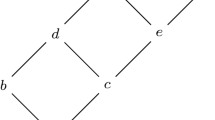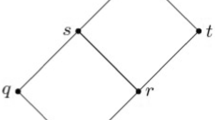Abstract
Recently, the concept of overlap functions on complete lattices has been introduced by extending the truth values set from the unit closed interval to complete lattices. On the other hand, the residual implications induced from commonly used aggregation functions (see, e.g., t-norms, pseudo-t-norms, uninorms, semi-uninorms and pseudo-uninorms), as a natural research topic of these commonly used aggregation functions in the case of lattice values, play a vital role in many-valued logic. In this paper, we consider the residual implications derived from the so-called \(C_L\)-overlap functions on complete lattices which are the weak form of overlap functions on complete lattices. To be precise, firstly, we give the notion of \(R_{\mathscr {O}}\)-implications which are residual implications induced from the \(C_L\)-overlap functions on complete lattices and give some basic properties of them. Secondly, we focus on the conditions under which \(R_{\mathscr {O}}\)-implications can satisfy the certain algebraic properties possessed by implications on complete lattices. Finally, we give a one-to-one correspondence between different families of certain implications on complete lattices and the family of \(C_L\)-overlap functions on complete lattices.
Similar content being viewed by others
Explore related subjects
Discover the latest articles, news and stories from top researchers in related subjects.Data availability
Enquiries about data availability should be directed to the authors.
Notes
A binary operator \(T:L\times L\longrightarrow L\) is a t-norm if it is commutative, associative, increasing and \(1_L\) is the neutral element. In addition, T is said to be continuous if it is left and right continuous at the same time and positive if \(T(x, y)= 0_L\) then either \(x = 0_L\) or \(y = 0_L\) (Zhang 2005).
References
Asmus TC, Dimuro GP, Bedregal B, Sanz JA, Pereira S Jr, Bustince H (2020) General interval-valued overlap functions and interval-valued overlap indices. Inf Sci 527:27–50
Asmus TC, Sanz JA, Dimuro GP, Bedregal B, Fernández J, Bustince H (2021) \(N\)-Dimensional admissibly ordered interval-valued overlap functions and its influence in interval-valued fuzzy-rule-based classification systems. IEEE Trans Fuzzy Syst 30:1060–1072
Asmus TC, Dimuro GP, Bedregal B, Sanz JA, Mesiar R, Bustince H (2021) Towards interval uncertainty propagation control in bivariate aggregation processes and the introduction of width-limited interval-valued overlap functions. Fuzzy Sets Syst. https://doi.org/10.1016/j.fss.2021.09.005
Baczyński M, Beliakov G, Bustince H, Pradera A (2013) Advances in fuzzy implication functions. Springer, Berlin
Bedregal B, Bustince H, Palmeira E, Dimuro G, Fernandez J (2017) Generalized interval-valued OWA operators with interval weights derived from interval-valued overlap functions. Int J Approx Reason 90:1–16
Bedregal B, Dimuro GP, Bustince H, Barrenechea E (2013) New results on overlap and grouping functions. Inf Sci 249:148–170
Beliakov G, Pradera A, Calvo T (2007) Aggregation functions: a guide for practitioners. Springer, Berlin
Bustince H, Fernandez J, Mesiar R, Montero J, Orduna R (2010) Overlap functions. Nonlinear Anal 72:1488–1499
Bustince H, Pagola M, Mesiar R, Hüllermeier E, Herrera F (2012) Grouping, overlaps, and generalized bientropic functions for fuzzy modeling of pairwise comparisons. IEEE Trans Fuzzy Syst 20:405–415
Cao M, Hu BQ, Qiao J (2018) On interval \(({\mathbb{G}},{\mathbb{N}})\)-implications and \(({\mathbb{O}},{\mathbb{G}},{\mathbb{N}})\)-implications derived from interval overlap and grouping functions. Int J Approx Reason 100:135–160
De Miguel L, Gómez D, Rodríguez JT, Montero J, Bustince H, Dimuro GP, Sanz JA (2019) General overlap functions. Fuzzy Sets Syst 372:81–96
Dilworth RP, Ward N (1939) Residuated lattices. Trans Am Math Soc 45:335–354
Dimuro GP, Bedregal B (2014) Archimedean overlap functions: The ordinal sum and the cancellation, idempotency and limiting properties. Fuzzy Sets Syst 252:39–54
Dimuro GP, Bedregal B (2015) On residual implications derived from overlap functions. Inf Sci 312:78–88
Dimuro GP, Bedregal B (2015) On the laws of contraposition for residual implications derived from overlap functions. In: 2015 IEEE international conference on fuzzy systems (FUZZ-IEEE), IEEE
Dimuro GP, Bedregal B, Bustince H, Jurio A, Baczyński M, Miś K (2017) \(QL\)-operations and \(QL\)-implication functions constructed from tuples \((O, G, N)\) and the generation of fuzzy subsethood and entropy measures. Int J Approx Reason 82:170–192
Dimuro GP, Bedregal B, Fernandez J, Sesma-Sara M, Pintor JM, Bustince H (2019) The law of \(O\)-conditionality for fuzzy implications constructed from overlap and grouping functions. Int J Approx Reason 105:27–48
Dimuro GP, Bedregal B, Bustince H, Asiáin MJ, Mesiar R (2016) On additive generators of overlap functions. Fuzzy Sets Syst 287:76–96
Elkano M, Galar M, Sanz J, Bustince H (2016) Fuzzy Rule-Based Classification Systems for multi-class problems using binary decomposition strategies: On the influence of n-dimensional overlap functions in the Fuzzy Reasoning Method. Inf Sci 332:94–114
Elkano M, Galar M, Sanz J, Fernández A, Barrenechea E, Herrera F, Bustince H (2015) Enhancing multi-class classification in FARC-HD fuzzy classifier: On the synergy between n-dimensional overlap functions and decomposition strategies. IEEE Trans Fuzzy Syst 23:1562–1580
Elkano M, Galar M, Sanz JA, Schiavo PF, Pereira S Jr, Dimuro GP, Borges EN, Bustince H (2018) Consensus via penalty functions for decision making in ensembles in fuzzy rule-based classification systems. Appl Soft Comput 67:728–740
Gierz G, Hofmann KH, Keimel K, Lawson JD, Mislove MW, Scott DS (1980) A compendium of continuous lattices. Springer, Berlin
Gierz G, Hofmann KH, Keimel K, Lawson JD, Mislove MW, Scott DS (2003) Continuous lattices and domains. Cambridge University Press, Cambridge
Gómez D, Montero J (2004) A discussion on aggregation functions. Kybernetika 40:107–120
Gómez D, Rodríguez JT, Montero J, Bustince H, Barrenechea E (2016) n-dimensional overlap functions. Fuzzy Sets Syst 287:57–75
Gómez D, Rodríguez JT, Yáñez J, Montero J (2016) A new modularity measure for Fuzzy Community detection problems based on overlap and grouping functions. Int J Approx Reason 74:88–107
Jurio A, Bustince H, Pagola M, Pradera A, Yager R (2013) Some properties of overlap and grouping functions and their application to image thresholding. Fuzzy Sets Syst 229:69–90
Liu HW (2012) Semi-uninorms and implications on a complete lattice. Fuzzy Sets Syst 191:72–82
Liu H, Zhao B (2019) On distributivity equations of implications over overlap functions and contrapositive symmetry equations of implications. J Intell Fuzzy Syst 36:283–294
Lucca G, Dimuro GP, Fernández J, Bustince H, Bedregal B, Sanz JA (2018) Improving the performance of fuzzy rule-based classification systems based on a non-averaging generalization of CC-integrals named \(C_{F_1F_2}\)-integrals. IEEE Trans Fuzzy Syst 27:124–134
Lucca G, Sanz JA, Dimuro GP, Bedregal B, Asiáin MJ, Elkano M, Bustince H (2017) CC-integrals: Choquet-like Copula-based aggregation functions and its application in fuzzy rule-based classification systems. Knowl-Based Syst 119:32–43
Lucca G, Sanz JA, Dimuro GP, Bedregal B, Bustince H, Mesiar R (2018) \(C_F\)-integrals: A new family of pre-aggregation functions with application to fuzzy rule-based classification systems. Inf Sci 435:94–110
Paiva R, Bedregal B, Santiago R, Vieira T (2021) Residuated implications derived from quasi-overlap functions on lattices. Int J Approx Reason 134:95–110
Paiva R, Palmeira E, Santiago R, Bedregal B (2021) Lattice-valued overlap and quasi-overlap functions. Inf Sci 562:180–199
Palmeira ES, Bedregal B, Bustince H, Paternain D, Miguel LD (2018) Application of two different methods for extending lattice-valued restricted equivalence functions used for constructing similarity measures on \(L\)-fuzzy sets. Inf Sci 441:95–112
Paternain D, Bustince H, Pagola M, Sussner P, Kolesárová A, Mesiar R (2016) Capacities and overlap indexes with an application in fuzzy rule-based classification systems. Fuzzy Sets Syst 305:70–94
Qiao J (2021) Overlap and grouping functions on complete lattices. Inf Sci 542:406–424
Qiao J (2019) On binary relations induced from overlap and grouping functions. Int J Approx Reason 106:155–171
Qiao J, Hu BQ (2017) On interval additive generators of interval overlap functions and interval grouping functions. Fuzzy Sets Syst 323:19–55
Su Y, Liu HW (2015) Characterizations of residual coimplications of pseudo-uninorms on a complete lattice. Fuzzy Sets Syst 261:44–59
Su Y, Liu HW, Pedrycz W (2017) Coimplications derived from pseudo-uninorms on a complete lattice. Int J Approx Reason 90:107–119
Su Y, Wang ZD (2013) Pseudo-uninorms and coimplications on a complete lattice. Fuzzy Sets Syst 224:53–62
Sun F, Wang X, Qu X, Shu Q, Zhang X (2019) Residual operations of monotone binary operations over complete lattices. Int J Approx Reason 110:127–144
Ti L, Zhou H (2018) On \((O, N)\)-coimplications derived from overlap functions and fuzzy negations. J Intell Fuzzy Syst 34:3993–4007
Wang ZD (2006) Generating pseudo-t-norms and implication operators. Fuzzy Sets Syst 157:398–410
Wang ZD (2016) Left (right) semi-uninorms and coimplications on a complete lattice. Fuzzy Sets Syst 287:227–239
Wang ZD, Fang JX (2007) On the direct decomposability of pseudo-t-norms, t-norms and implication operators on product lattices. Fuzzy Sets Syst 158:2494–2503
Wang ZD, Fang JX (2008) Residual coimplicators of left and right uninorms on a complete lattice. Fuzzy Sets Syst 160:2086–2096
Wang ZD, Fang JX (2009) Residual operations of left and right uninorms on a complete lattice. Fuzzy Sets Syst 160:22–31
Wang YM, Liu HW (2019) The modularity condition for overlap and grouping functions. Fuzzy Sets Syst 372:97–110
Wang ZD, Niu MX, Hao XY (2015) Constructions of coimplications and left (right) semi-uninorms on a complete lattice. Inf Sci 317:181–195
Wang ZD, Wang Y, Niu MX, Hao XY (2017) Constructing strict left (right)-disjunctive left (right) semi-uninorms and coimplications satisfying the order property. Fuzzy Sets Syst 323:79–93
Wang ZD, Yu YD (2002) Pseudo-t-norms and implication operators on a complete Brouwerian lattice. Fuzzy Sets Syst 132:113–124
Wang ZD, Yu YD (2003) Pseudo-t-norms and implication operators: direct products and direct product decompositions. Fuzzy Sets Syst 139:673–683
Zhang D (2005) Triangular norms on partially ordered sets. Fuzzy Sets Syst 153:195–209
Zhang T, Qin F (2020) On distributive laws between 2-uninorms and overlap (grouping) functions. Int J Approx Reason 119:353–372
Zhang T, Qin F, Li W (2021) On the distributivity equations between uni-nullnorms and overlap (grouping) functions. Fuzzy Sets Syst 403:56–77
Zhou H, Yan X (2021) Migrativity properties of overlap functions over uninorms. Fuzzy Sets Syst 403:10–37
Funding
This work was supported by the National Natural Science Foundation of China (62166037 and 11901465), the Science and Technology Program of Gansu Province (20JR10RA101), the China Postdoctoral Science Foundation (2021M692561), the Scientific Research Fund for Young Teachers of Northwest Normal University (NWNU-LKQN-18-28) and the Doctoral Research Fund of Northwest Normal University (6014/0002020202).
Author information
Authors and Affiliations
Corresponding author
Ethics declarations
Conflict of interest
Author Junsheng Qiao declares that he has no conflict of interest.
Human and animal rights
This article does not contain any studies with human participants or animals performed by the author.
Additional information
Publisher's Note
Springer Nature remains neutral with regard to jurisdictional claims in published maps and institutional affiliations.
Rights and permissions
About this article
Cite this article
Qiao, J. \(R_{\mathscr {O}}\)-implications induced from \(C_L\)-overlap functions on complete lattices. Soft Comput 26, 8229–8243 (2022). https://doi.org/10.1007/s00500-022-07241-2
Accepted:
Published:
Issue Date:
DOI: https://doi.org/10.1007/s00500-022-07241-2




